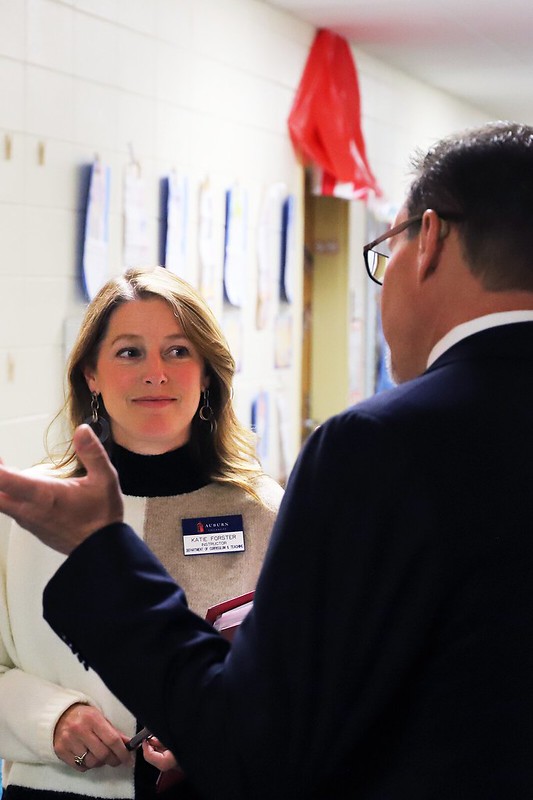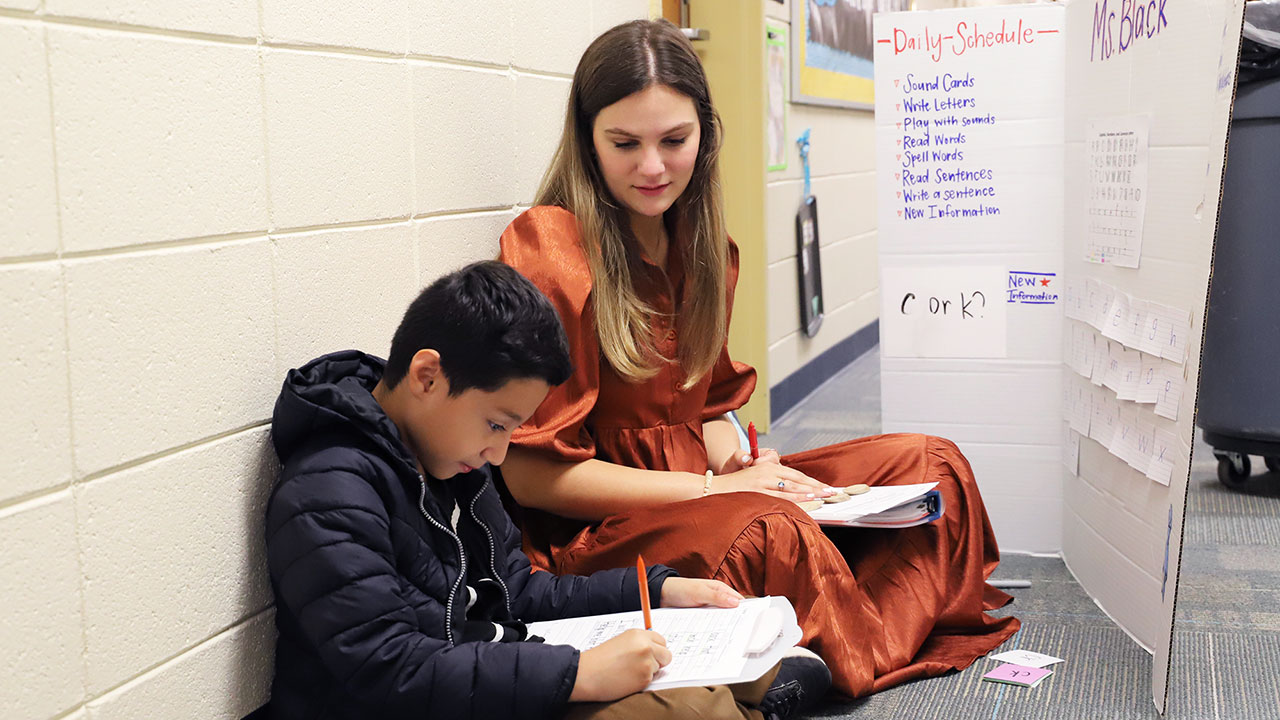content body

Katie Forster chats with College of Education Dean Jeffrey Fairbrother on a visit to Richland Elementary.
Katie Forster is not only a fourth-generation alumna, she’s also a current Auburn student, parent and faculty member teaching in the College of Education.
“It’s really kind of a dream come true to have an opportunity to teach what I care so much about,” she said. “I grew up here, and I didn’t consider going anywhere else for college, so I’m an Auburn girl for sure. Isn’t it interesting how it comes full circle?”
Forster grew up in Auburn, and after earning a bachelor’s degree in elementary education, she taught in Auburn City Schools for six years while working toward a master’s in reading education. She went on to teach in a variety of educational settings, including a private classical academy, a preschool and as an adjunct professor at Auburn.
She also spent time working in private practice, and that was where she first realized her interest in teaching students with dyslexia. Her oldest child has dyslexia, and Forster began to see the difference she could make in the lives of students, parents and teachers.
“At that time, there was a disconnect between reading education and dyslexia education,” she said. “I would have conferences with the teachers of my dyslexic students and saw they felt frustrated they didn’t have the information they needed to help them.”
Forster began to do some research and found the Orton-Gillingham approach to be the gold standard for teaching students with dyslexia, so she did a two-week intensive training and practicum in the technique. Orton-Gillingham is helpful for children with dyslexia because of its highly structured, multisensory and sequential approach to teaching reading, writing and spelling. She brought her expertise back to her work at the local private practice A.L.L. for Children, and she worked there tutoring students ranging in age from preschool to college until she began as a clinical lecturer in the College of Education in fall 2022.
As a faculty member in the Reading Education program, she teaches Foundations of Language and Literacy by starting from scratch, educating her college students on the basics of phonics.
“On the first day of class, they write their alphabet, properly forming their letters, because they have to teach it,” she said. “We spend time learning about the structure and origin of our language. We focus on emergent literacy, alphabet knowledge, phonological awareness and phonics.”
After Forster lectures on these concepts and the research behind them, she helps her students craft lesson plans they will put into practice through the course’s tutoring program. Once a week, they go to a local elementary school and work one-on-one with children who have been identified as needing extra reading support.
“It’s amazing that our students get to do one-on-one tutoring, and they are learning so much,” she said. “They plan lessons on their own and make diagnostic notes while teaching to the students’ strengths and weaknesses. The teachers in the schools tell me they can really see a difference.”
Her students agree the tutoring program is valuable, but they also benefit greatly from having her as a teacher.
“Her class is all about learning how to explain the tiny little details about the English language you have never really thought of before,” said student Emily Cain. “Mrs. Forster makes sure her assignments are realistic and have meaning behind them. She explains how to teach the foundations of reading to students, and we get to see it in action every Thursday morning when we tutor.”
Student Madi Preston feels she is now better equipped to teach reading in a classroom, and she knows the information she’s learned from Forster will stick with her throughout her career.
“Mrs. Forster has taught us an evidence-based strategy that is inclusive for all learners,” she said. “Our future students will get the instruction they need to become proficient readers and writers. She advocates for her students at Auburn and pushes us to advocate for our students in the years ahead.”
Forster brings years of experience teaching students with dyslexia into the classroom, and she’s happy to share her knowledge with Auburn students. Because she is eager to learn even more, she recently began the College of Education’s Reading Education doctoral program.
“I started thinking about getting my doctorate last year,” she said. “I feel inspired and supported by my colleagues. I’m enjoying being a student again.”
In addition to being a faculty member and a doctoral student, Forster is also an Auburn parent. Her children are fifth-generation Auburn students, with her daughter enrolled as a sophomore this year and her son set to enroll at Auburn in 2024.
One of her favorite experiences as a faculty member is returning to her childhood elementary school, Cary Woods Elementary, where she guides the next generation of teachers in classroom exercises. Having obtained training in dyslexia education and experience in a wide range of settings, Forster is grateful her path has taken her back to Auburn.
“Reading education has shifted in a direction that is aligned with my training,” she said. “I am so happy to be passing that on to our students, and I’m really excited about the things I’m going to learn in the future.”
Want to know more about Auburn’s Reading Education program?
Read more




